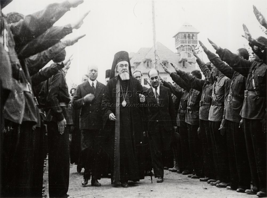Events
The Vienna Wiesenthal Institute for Holocaust Studies (VWI) organises academic events in order to provide the broader public as well as an expert audience with regular insights into the most recent research results in the fields of Holocaust, genocide, and racism research. These events, some of which extend beyond academia in the stricter sense, take on different formats ranging from small lectures to the larger Simon Wiesenthal Lectures and from workshops addressing an expert audience to larger international conferences and the Simon Wiesenthal Conferences. This reflects the institute’s wide range of activities.
The range of events further extends to the presentation of selected new publications on the institute’s topics of interest, interventions in the public space, the film series VWI Visuals, and the fellows’ expert colloquia.
| VWI invites/goes to... | |||
| Ionuț-Florin Biliuta: Sowing the Seeds of Hate – The Antisemitism of the Orthodox Church in Interwar Romania | |||
Wednesday, 18. March 2015, 16:00 - 17:30 Institute for Human Sciences, Spittelauer Lände 3, 1090 Vienna
|
|||
VWI goes to the IWM
Comments by Oliver Jens Schmitt
Ionuț-Florin Biliuta is currently a Junior Fellow at the VWI. He has a PhD in History from CEU (Budapest, Hungary) and is a PhD student in Theology at Babeş-Bolyai University (Cluj-Napoca, Romania). He has nu-merous publications in Romanian historical journals. Together with Nadia Al-Bagdadi and Anca Şincan, he is currently editing 'Transforming a Church. Eastern Christianity in Post-Imperial Societies' (Budapest: CEU University Press, 2014).
Univ.-Prof. Dr. Oliver Jens Schmitt is historian, Professor of Eastern European History at the University of Vienna.
In cooperation with:
|
|||











 The present project is focused on the antisemitic discourse of several prominent orthodox clergy-men and theologians associated with the Romanian Iron Guard and the radicalisation of orthodox nationalism under the impact of fascism. Under a wave of right-wing ideological radicalisation, or-thodox clergymen and theologians shifted from understanding the Jew according to the Patristic theology and Canon law to a more confessional, exclusivist trend of theology. The contributions of the Orthodox theologians and laymen to the narrative related to identity construction in post 1918 Romania led to a process of exclusion of the Jews from the midst of the nation fundamentally dif-ferent from other fascist movements, namely the exclusion on confessional grounds: if a Romanian citizen did not share the same religious confession as the majority of the population, he was deemed ethnically unfit to be a
The present project is focused on the antisemitic discourse of several prominent orthodox clergy-men and theologians associated with the Romanian Iron Guard and the radicalisation of orthodox nationalism under the impact of fascism. Under a wave of right-wing ideological radicalisation, or-thodox clergymen and theologians shifted from understanding the Jew according to the Patristic theology and Canon law to a more confessional, exclusivist trend of theology. The contributions of the Orthodox theologians and laymen to the narrative related to identity construction in post 1918 Romania led to a process of exclusion of the Jews from the midst of the nation fundamentally dif-ferent from other fascist movements, namely the exclusion on confessional grounds: if a Romanian citizen did not share the same religious confession as the majority of the population, he was deemed ethnically unfit to be a 
